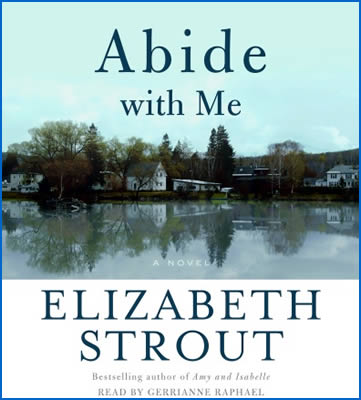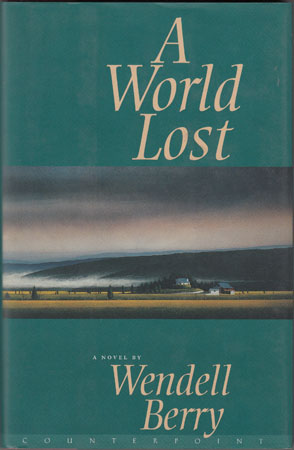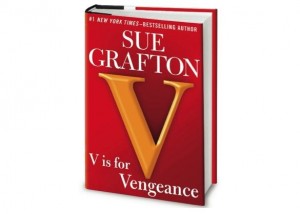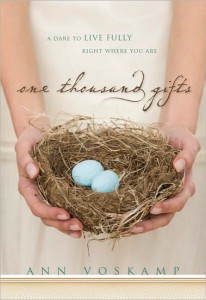
by jphilo | Feb 4, 2013 | Daily Life, Reviews

Regularly scheduled programming will resume as soon the writer quits coughing, finds a new box of tissues, and recovers from taking a dizzy tumble in the kitchen.
photo credit: www.freedigitalphotos.net

by jphilo | Dec 11, 2012 | Reviews

Elizabeth Strout’s second novel, Abide with Me, was released in 2007. I recently finished listening to the audio version of this gem. It’s often eclipsed by the author’s third book, Olive Kitteridge, for which she received a Pulitzer. Here are my top ten reasons to read or listen to Abide with Me.
10. Strout masterfully uses the weather and seasons to enhance the mood of characters and of West Annett where they live.
9. The Maine town in 1959 is accurate from the paste used by kindergarteners to the acceptance of smoking, from the bomb shelters in back yards to World War 2 vets burying their trauma.
8. She paints a vulnerable and painful picture of humanity: small town church life, complete with broken people trying to hide their brokenness by gossiping about the brokenness of others.
7. The climate of the elementary school and the attitudes of the teachers are spot on. As a former teacher I appreciated the teachers wearing high heels, dresses, and nylon stockings during playground duty on cold fall days–something my mom complained about during her teaching career in the 1950s and 60s.
6. Five-year-old Katherine is an authentic and complex character. Her confused thoughts, guilt, fear, and loneliness are portrayed with compassion, but without sentimentality.
5. One of the characters confesses to something totally unexpected and believable.
4. Lauren Caskey, the pastor’s wife, is not a normal pastor’s wife. Strout only hints about the source of her brokenness, enough to make readers curious and yet willing to grant her grace.
3. Tyler Caskey, the young minister, isn’t portrayed as either sanctimonious or saccharinely sweet. When he goes through his faith crisis, he is like you and me, not like a minister. He can barely hang on, barely function, barely see beyond himself. He is disillusioned by the cruelty and foolishness of people and himself. He is saved by the actions of people who, in their weakness, display the kindness and forgiveness of Christ.
2. Abide with Me demonstrates the power of and need for forgiveness on many levels in many lives.
1. Abide with Me is a story of redemption and hope. Our world is in sore need of both.
Have you read Abide with Me? Please, share your thoughts in the comment box.

by jphilo | Nov 5, 2012 | Reviews

A week ago, I closed the slim volume of Wendell Berry’s Port William novel, A World Lost with reluctance. Since Wendell Berry’s books came to my notice twice in the same month a few years back–first through a book review that cited Hannah Coulter as an example of quality literature from a Christian world view, and then through my son who was reading Berry’s agrarian essays–I’ve greeted the end of each novel with the same reluctance.
Berry’s prose is poetic (he’s written several volumes of poetry, too) in the charming manner of southern writer. His characters are finely drawn, deeply flawed and likable, constantly evolving. The town of Port William and the surrounding countryside where the novels take place in the 1920s through the 1950s are whole and real. The setting stirs my earliest memories of visits to my grandparents’ farm at the end of that era. Berry’s ability to authentically communicate his faith without preaching or sanctimony is the lynchpin of his writing. Like Marilyn Robinson in Gilead and Home, Berry’s belief system infuses his writing and characters.
A World Lost is written by Andy Catlett, a Port William native who is revisiting the death of his beloved Uncle Andy for whom he was named. The uncle’s murder occurred fifty years earlier when the narrator was ten and the facts were kept from him. The narrator gently and quietly unearths the truth, and he ends his quest with a description of the Christian’s heaven and hope that brought me to tears.
One by one, the sharers in this mortal damage have born its burden out of the present world…At times perhaps I could wish them merely oblivious, and the whole groaning and travailing world at rest in their oblivion. But how can I deny that in my belief they are risen?
I imagine the dead waking, dazed, into a shadowless light in which they know themselves altogether for the first time. It is a light that is merciless until they can accept its mercy; by it they are at once condemned and redeemed. It is Hell until it is Heaven. Seeing themselves in that light, if they are willing, they see how far they have failed the only justice of loving one another; it punishes them by their own judgment. And yet, in suffering that light’s awful clarity, in seeing themselves within it, they see its forgiveness and its beauty, and are consoled. In it they are loved completely, even as they have been, and are so changed into what they could not have been but what, if they could have imagined it, they would have wished to be.
That light can come into this world only as love, and love can enter only by suffering. Not enough light has ever reached us here among the shadows, and yet I think it has never been entirely absent.
Remembering, I suppose, the best days of my childhood, I used to think I wanted most of all to be happy–by which I meant to be here and to be undistracted. If I were here and undistracted, I thought, I would be home.
But now I have been here a fair amount of time, and slowly I have learned that my true home is not just this place but is also that company of immortals with whom I have lived here day by day. I live in their love, and I know something of the cost. Sometimes in the darkness of my own shadow I know that I could not see at all were it not for this old injury of love and grief, this little flickering lamp that I have watched beside for all these years.
At the end of each Wendell Berry book, I close the cover with reluctance for one over-riding reason. I do not want the little flickering lamp of hope illuminated in his beautiful prose to go out.

by jphilo | Jun 20, 2012 | Reviews

Community Supported Agriculture (CSA) season is here, so every week we pick up a bag of fresh picked veggies and fruits at Wilber’s Northside Market. Last week’s bag contained 4 ears of sweet corn, sugar snap peas, 2 quarts of strawberries, a bag of lettuce, and a half dozen, medium-sized onions. The CSA weekly newsletter ran a recipe for grilled red onions, which Hiram and I tested on Father’s Day. The results were delicious, so I’m sharing my adaptation of the side dish with you today.
Grilled Red Onions
4 large red onions
4 bacon strips
8 garlic cloves, peeled
6 oregano sprigs
2 teaspoons red wine vinegar
1 tablespoon olive oil
salt and pepper to taste
Cut red onions into wedges and quarter 8 bacon strips. Place in medium bowl and toss with remaining ingredients.

Divide between 2 large pieces of foil; seal into flat packets.

Grill over high heat, 15 minutes. Let rest before opening.
The grilled onions were delicious, though I think we cooked them a little longer than necessary. Next time we make them, I’ll skip the olive oil, as the bacon provides enough fat to keep the veggies from sticking to the foil. Also, I may use some of the other spices in my kitchen garden – rosemary, thyme, chives, parsley – to see how the flavors change.
What variations do you suggest? Leave a comment

by jphilo | Feb 6, 2012 | Reviews

Are you fighting cabin fever? Are you longing to escape to another world? Somewhere warm and sunny, exciting and mysterious?
Sue Grafton’s latest Kinsey Milhone novel, V is for Vengeance, is your ticket to ride. The 22nd book of her alphabet series takes you to the shadier side of sunny, fictional St. Theresa, California. Grafton populates the landscape with familiar reoccurring characters. The protagonist Kinsey still acts like a twenty-something holding commitment and permanence at bay, though she’s about to turn 38. Henry, her octogenarian landlord and best friend, puts in his usual, comforting appearance. So does his brother, William the hypochondriac, as well as William’s wife, Rosie and her shudderingly awful Hungarian cooking.
Many of the new characters introduced by Grafton are rich and multifaceted. An organized crime boss who turns out to be anything but stereotypical. The superficial society woman who reveals a surprising depth of character. The low-level career criminal devoted to a wife who discovers she’s a natural cosmetics salesperson. Grafton weaves all these characters into an intricate plot, lacing it with enough suspense and mystery to keep the reader engrossed to the very end.
Other than a preachy tone when describing the details of retail theft rings, Grafton serves up pure entertainment in V is for Vengeance. She is a master at recreating the world of detecting in the late 1980s. Kinsey goes to the library to look at phone books. Phone calls wait until she finds a phone booth or reaches her office or home. Grafton’s also one of the few authors who writes about daily activities beyond food and sex. She mentions trips to the bathroom, doing laundry, cleaning the office, setting the table. She makes Kinsey so real, her protagonist becomes your friend. The kind of friend you miss when you’re apart, but drives you a little crazy whenever you’re together. Those are some of the reasons Grafton’s fans have stuck with her from A through V and are eagerly awaiting the next book in the series.
I’m already wondering what W will stand for. Secretly, I’m hoping the book comes out early next winter. By then, I’ll be ready for another adventure in sunny, warm St. Theresa. By then, I’ll miss Kinsey again. By then, I’ll be ready for another of Grafton’s perfect antidotes to cabin fever. How about you?

by jphilo | Jan 13, 2012 | Reviews

Gratitude.
Thanksgiving.
Mindfulness.
These are lessons God has taught me over and over in the past decade. Through times of joy and sorrow, in everyday events and extraordinary ones, he had showed me the importance of gratitude, thanksgiving, and mindfulness in all things.
So in one sense, I was prepared to read and appreciate the life lessons author Ann Voskamp shares in One Thousand Gifts. In another sense, the book was a delightful surprise. Page by page, Voskamp unwrapped God’s lessons using word pictures and poetic prose that took my breath away time and time again.
She can transform a walk through a field of wheat stubble and everyday life into an altar of worship:
The wheat stubble scratches my legs as I walk in the fields. One hand fingers the hem of my splotchy apron. I am going back. I look up…reluctant to untether from the moon. The world I live in is loud and blurring and toilets plug and I get speeding tickets and the dog gets sick all over the back step and I forget everything and these six kids lean hard into me all day to teach and raise and lead and I fail hard and there are real souls that are at stake and how long do I really have to figure out how to live full of grace, full of joy-before these six beautiful children fly the coop and my mothering days fold up quiet? How do you open the eyes to see how to take the daily, domestic, workday vortex and invert it into the dome of an everyday cathedral?
Every page is like that. Every paragraph is a feast of the everyday turned exceptional. Every chapter is so rich it’s best eaten in moderation, one or two pages at a time. Slowly, with plenty of chewing in between bites. Plenty of time to sit at the table with Voskamp and taste God and find him good in a way you’ve never tasted him before. Though her word pictures are rich, Voskamp is also aware of and transparent about her personal frailty and failures. She doesn’t put herself above readers, but invites them to walk with her, equal in hunger and need for God.
One Thousand Gifts by Ann Voskamp is more than a good read. It’s a must read for Christ followers serious about their faith.









